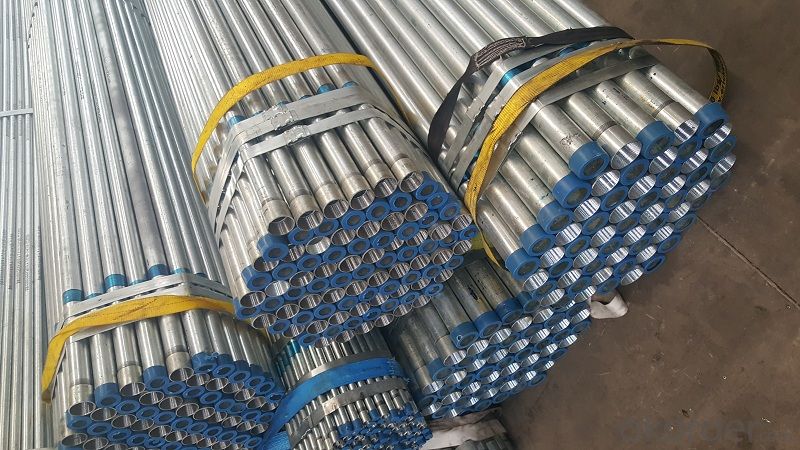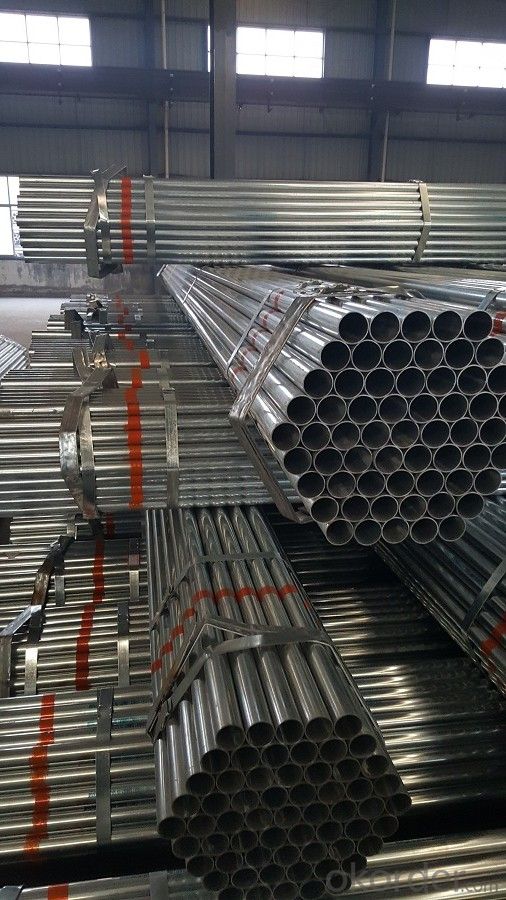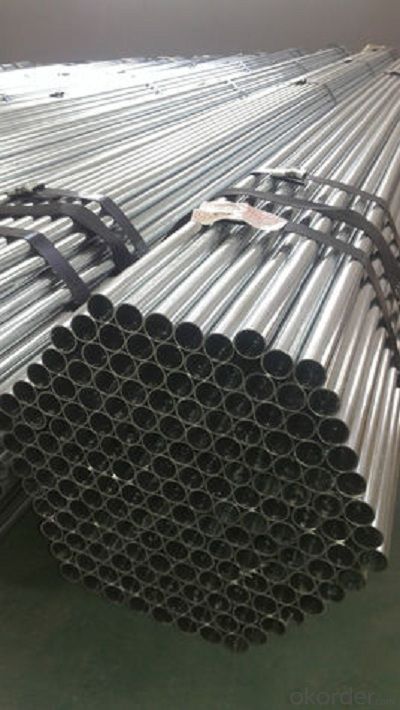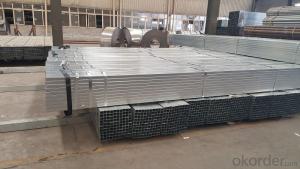Galvanized welded steel pipe for materials
- Loading Port:
- Tianjin
- Payment Terms:
- TT OR LC
- Min Order Qty:
- 12 m.t.
- Supply Capability:
- 20000 m.t./month
OKorder Service Pledge
OKorder Financial Service
You Might Also Like
Item specifice
1、Structure of Galvanized welded steel pipe for materials :
The surface of galvanized steel pipe welded steel pipe of hot dip galvanized layer or. Galvanized can increase the corrosion resistance of the steel tube, prolong service life. Galvanized pipe is widely used, in addition to water, gas, oil and other general low pressure fluid pipelines. It is also used in the petroleum industry, especially for offshore oil field of oil well pipe and oil pipe, chemical, coking equipment of oil heater, condensation cooler, coal run oil exchanger tube, and trestle pile, the mine tunnel support frame tube.
2、Main Features of Galvanized welded steel pipe for building materials :
• High manufacturing accuracy
• High strength
• Good visual effect
• Reasonable price
3、 Galvanized welded steel pipe for building materials Specification:
Standard | GB, DIN, ASTM ASTM A106-2006, ASTM A53-2007 |
Grade | 10#-45#, 16Mn 10#, 20#, 45#, 16Mn |
Thickness | 1 - 33 mm |
Section Shape | Round |
Outer Diameter | 21 - 610mm |
Place of Origin | Tianjin, China (Mainland) |
Secondary Or Not | Non-secondary |
Application | Hydraulic Pipe |
Technique | Cold Drawn |
Certification | API |
Surface Treatment | factory state or painted black |
Special Pipe | API Pipe |
Alloy Or Not | Non-alloy |
Length | 5-12M |
Outer Diameter | 21.3-610mm |
Grade | 20#, 45#, Q345, API J55, API K55, API L80, API N80, API P110, A53B |
Standard | ASME, ASTM |
1) Material:Q195 Q235 Q345 X42 X52
2) Specification range:OD:21.3-610mm,WT:6-70mm,length:6-12m or according to the requirement of clients.
3) Excutive standards:GB,ASME API5L.ASTM A 106/A53,Despite of the above standards,we can also supply seamless steel pipe with standard of DIN,JIS,and so on,and also develop new products according to the requirements
4、Packaging & Delivery
Packaging Details: | seaworthy package,bundles wrapped with strong steel strip |
Delivery Detail: | 15-30days after received 30%TT |
5、FAQ of Galvanized welded steel pipe for building materials :
①How is the quality of your products?
Our products are manufactured strictly according to national and internaional standard, and we take a test
on every pipe before delivered out. If you want see our quality certifications and all kinds of testing report, please just ask us for it.
Guaranteed: If products’ quality don’t accord to discription as we give or the promise before you place order, we promise 100% refund.
②How about price?
Yes, we are factory and be able to give you lowest price below market one, and we have a policy that “ for saving time and absolutely honest business attitude, we quote as lowest as possible for any customer, and discount can be given according to quantity”,if you like bargain and factory price is not low enough as you think, just don’t waste your time.Please trust the quotation we would give you, it is professional one.
6、 Galvanized welded steel pipe for building materials Images:



- Q:Can steel pipes be used for heating and cooling systems?
- Yes, steel pipes can be used for heating and cooling systems. Steel pipes are commonly used in HVAC (heating, ventilation, and air conditioning) systems due to their durability, strength, and resistance to high temperatures. They are especially suitable for transporting hot water or steam for heating purposes and can also handle the circulation of chilled water for cooling systems.
- Q:How to make the internal tooth of the steel pipe?
- At present, in our country, 300MW or 600MW or more large capacity sub critical and supercritical thermal power boilers are designed or imported abroad. Membrane internal wall tubes are widely used in membrane water wall.
- Q:Can steel pipes be used for hydroelectric power plants?
- Yes, steel pipes can be used for hydroelectric power plants. Steel pipes are commonly used in hydroelectric power plants for various applications. They are primarily used in the penstock, which is a pipe that carries water from the reservoir to the turbine. The penstock is under high pressure, and steel pipes have the necessary strength and durability to handle the pressure and flow of water. Steel pipes are preferred in hydroelectric power plants due to their high tensile strength, corrosion resistance, and longevity. They can withstand the high-pressure conditions and flow rates of water, ensuring the efficient transfer of water from the reservoir to the turbine. Additionally, steel pipes have the advantage of being easily fabricated and installed. They can be customized to fit specific project requirements and can be welded or bolted together to form the desired length and shape. Furthermore, steel pipes are cost-effective compared to other materials commonly used in hydroelectric power plants, such as concrete or fiberglass. They provide a reliable and cost-efficient solution for conveying water in hydroelectric power plants, contributing to the overall efficiency and effectiveness of the power generation process. In conclusion, steel pipes are a suitable and commonly used material for hydroelectric power plants. They offer the necessary strength, durability, and cost-effectiveness required for conveying water from the reservoir to the turbine, making them an ideal choice for this application.
- Q:What is the difference between steel pipe and round steel?
- The middle of the steel pipe is hollow, and the round steel is solid. When compared with the solid steel such as round steel, the steel tube has the same flexural strength and torsion strengthLight weight, is an economic section of steel, widely used in the manufacture of structural and mechanical parts, such as oil drilling pipe, automobile transmission shaft, bicycle frame and steel scaffolding used in construction.
- Q:How are steel pipes used in sewage systems?
- Steel pipes are commonly used in sewage systems due to their durability and strength. They are used to transport sewage from homes, buildings, and industries to treatment plants or disposal sites. The corrosion-resistant properties of steel make it an ideal material for sewage systems, ensuring longevity and preventing leaks. Additionally, steel pipes can withstand high pressure and heavy loads, making them suitable for underground installations.
- Q:Can steel pipes be used for underground sprinkler systems?
- Yes, steel pipes can be used for underground sprinkler systems. However, it is important to note that steel pipes are not as commonly used as other materials like PVC or polyethylene due to their susceptibility to corrosion. If steel pipes are chosen for this application, they should be coated or lined to protect them from underground moisture and ensure their longevity.
- Q:What are the factors to consider when selecting a steel pipe for a specific application?
- When selecting a steel pipe for a specific application, several factors need to be considered. These include the type of fluid or gas being transported, the pressure and temperature conditions, the size and dimensions required, the desired corrosion resistance, and the overall budget for the project. It is also crucial to assess the pipe's material properties, such as its strength, ductility, and toughness, to ensure it can withstand the operational demands of the application. Additionally, factors like the pipe's manufacturing process, compatibility with joining methods, and any specific industry standards or regulations should be taken into account.
- Q:Can steel pipes be used for underground fire sprinkler systems?
- Yes, steel pipes can be used for underground fire sprinkler systems. Steel pipes are commonly used for their strength and durability, making them suitable for underground installations. However, it is important to ensure that the steel pipes are properly coated or protected against corrosion to maintain their integrity over time.
- Q:What is the difference between steel pipe and PVC pipe?
- Both steel pipe and PVC pipe are commonly utilized materials for plumbing and other construction purposes; however, they possess several distinct dissimilarities. To begin with, the materials themselves differ. Steel pipe is manufactured from a blend of iron and carbon, known as steel. This material is renowned for its robustness and durability, rendering it appropriate for high-pressure applications and subterranean installations. Conversely, PVC (polyvinyl chloride) pipe is crafted from a type of plastic called PVC. PVC pipe is characterized by its lightweight nature, flexibility, and ease of handling, making it a favored choice for residential plumbing and irrigation systems. Next, the installation process varies. Steel pipe necessitates skilled labor and specialized tools for cutting, threading, and welding. It frequently involves a complex installation procedure, particularly for larger pipe sizes. Conversely, PVC pipe can be effortlessly cut with a saw or specialized pipe cutter and joined together utilizing solvent cement or threaded fittings. This renders PVC pipe more suitable for DIY projects and simpler installations. Moreover, steel pipe incurs greater costs compared to PVC pipe. Steel is a pricier material, and the manufacturing process for steel pipe is more intricate, entailing multiple steps and additional materials. PVC pipe, as a plastic-based material, is generally less expensive and more cost-effective, particularly for smaller diameter applications. In terms of performance, steel pipe possesses greater tensile strength, can endure higher levels of pressure, and exhibits greater resistance to temperature fluctuations, rendering it ideal for heavy-duty and industrial applications. Conversely, PVC pipe possesses lower tensile strength but is resistant to corrosion, chemicals, and scale buildup. PVC pipe is commonly employed in residential plumbing, irrigation systems, and other non-industrial applications. To summarize, the primary disparities between steel pipe and PVC pipe revolve around the materials used, installation processes, costs, and performance characteristics. While steel pipe is sturdier and more suitable for heavy-duty applications, PVC pipe is lighter, easier to install, and more cost-effective for residential and non-industrial purposes.
- Q:How big is the seamless steel tube of DN50?
- Domestic steel pipe diameter is generally divided into A series and B series, DN50 pipe diameter of 60mm and 57mm respectively, the wall thickness should be based on your design pressure, temperature, pipe material to calculate.
1. Manufacturer Overview |
|
|---|---|
| Location | |
| Year Established | |
| Annual Output Value | |
| Main Markets | |
| Company Certifications | |
2. Manufacturer Certificates |
|
|---|---|
| a) Certification Name | |
| Range | |
| Reference | |
| Validity Period | |
3. Manufacturer Capability |
|
|---|---|
| a)Trade Capacity | |
| Nearest Port | |
| Export Percentage | |
| No.of Employees in Trade Department | |
| Language Spoken: | |
| b)Factory Information | |
| Factory Size: | |
| No. of Production Lines | |
| Contract Manufacturing | |
| Product Price Range | |
Send your message to us
Galvanized welded steel pipe for materials
- Loading Port:
- Tianjin
- Payment Terms:
- TT OR LC
- Min Order Qty:
- 12 m.t.
- Supply Capability:
- 20000 m.t./month
OKorder Service Pledge
OKorder Financial Service
Similar products
New products
Hot products
Related keywords





























